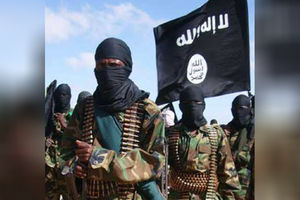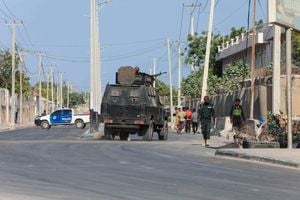
Somalia's President Hassan Sheikh Mohamud speaks during a past interview inside his office at the presidential palace in Mogadishu, Somalia on May 28, 2022.
Egypt and Ethiopia have escalated their age-old feud over the Nile into an arms race in Somalia that is now likely to affect the neighbours' cooperation in the fight against terrorism.
Somalia has said it reserves the sovereign right to determine who delivers arms on its soil and which foreign troops it allows to come in and support its nascent security forces. But Ethiopia sees this as a direct threat to its security, mainly because Mogadishu's friend is now Cairo, an old enemy of Addis Ababa.
Ethiopia and Egypt have never confronted each other, and their tensions over the Nile dam in Ethiopia, known as the Grand Renaissance Dam (GERD), have so far been a war of words.
Since last month, when Egypt first delivered arms to Somalia in preparation for sending troops there from early next year, the first confrontation seemed likely. On Monday, Egypt delivered more weapons by ship to the Port of Mogadishu. Egypt is also reportedly deploying more warships in the Red Sea to escort the transport of more materiel, the military equipment needed to support troops in Somalia.
A dispatch from Cairo on Tuesday said that Egypt had sent "military aid" to Mogadishu, suggesting that it was intended to "build the capacity of the Somali army".
Ethiopia already has troops in Somalia, partly as part of the African Union Transition Mission (Atmis) and bilaterally with Somalia. The ship's delivery from Cairo came just two days after Somalia protested Ethiopia's delivery of weapons to the state of Puntland, arguing that it was a violation of Somalia's sovereignty.
Regardless of who's right or wrong, Ethiopian officials have publicly argued that supplying arms to Somalia, which is still building its security services, poses a risk to the region, which has yet to win the war against al-Shabaab.
“There is concern about the transfer of arms to unstable regions, with the fear that Egypt’s heavy weapons may end up in the hands of al-Shabaab,” argued Tarekegn Bululta, a State Minister for Industry in Ethiopia.
“Such weapons could increase the group’s capabilities and pose a serious threat to the security of Somalia and beyond.”
On Monday, Ethiopian media quoted Foreign Affairs Minister Taye Atske Selassie warning that “external forces”, which he didn’t name, would further undermine the fragile security, benefitting al-Shabaab and other terror merchants.
But Ahmed Moalim Fiqi, Somalia minister of Foreign Affairs, argued that Ethiopia was raising a false alarm to avoid taking responsibility for shipping arms to Puntland, which could easily end up in the hands of terrorists. Fiqi met with Egyptian counterpart Badr Abdelatty and Eritrea’s Osman Saleh on Monday on the sidelines of the ongoing UN General Assembly in New York, where they “committed to stronger ties.” That meeting was significant because it could upend the Horn coalition formed by Somalia, Ethiopia and Eritrea in 2018, which now appears fractured to Egypt's advantage.
According to Mogadishu, Ethiopia shipped a consignment of weapons to Puntland, which were escorted from Ethiopia to the border by local forces known as the Liyu Police, and then taken over by Puntland security forces.
Shortly afterwards, Somalia's Foreign Affairs Ministry issued a statement strongly condemning Ethiopia for what it described as the illegal smuggling of arms into Somalia's 'Puntland region'.
“This action constitutes a grave infringement on Somalia’s sovereignty and poses serious implications for national and regional security,” the statement said last Friday.
Mogadishu claimed that this was not an isolated incident, but it mirrored previous unauthorised arms shipments from Ethiopia, with reports of weapons being transported into the Galmudug region and another cache being flown into Baidoa.
The statement referred to a large shipment of weapons in mid-July that was looted by clan militias near Abudwak town, 870km north of Mogadishu.
“Such recurrent activities indicate an ongoing disregard for Somalia's sovereignty,” the Somali government said, insisting that Ethiopia immediately cease such activities.
“We call on our regional and international partners to reinforce our collective efforts to uphold peace and stability in the region,” the Somali ministry said, demanding an immediate cessation of what it called "transgressions" by Ethiopia.
The dispute between them didn’t start last week. Since Ethiopian Prime Minister Abiy Ahmed signed a Memorandum of Understanding (MoU) with the leader of the breakaway Somaliland Authority to lease 20km of coastline to landlocked Ethiopia for 50 years to establish a naval base and a commercial port in exchange for recognition, the relations between Mogadishu and Addis Ababa soured.
Somalia, which considers Somaliland, a former British Protectorate, as part of its territory, considered the MoU illegitimate and a blatant aggression against its sovereignty, national unity and territorial integrity.
Somalia attracted the attention of many states and institutions, including the European Union, the United States and the United Nations, which asked that Somalia’s sovereignty be respected.
Following the controversial MoU, Somalia has asked the African Union to exclude Ethiopian troops from being part of a planned stabilisation force called the African Union Support Mission in Somalia (AUSSOM), which is set to replace the outgoing ATMIS.
Instead of Ethiopia, Mogadishu preferred Egypt, a rival of Addis Ababa in the management of the Nile waters, to be part of the AUSSOM contingents that will support Somali security forces from January 1, 2025.
Ethiopia considered Somalia ungrateful for its efforts to combat Islamist insurgents, sacrificing both military personnel and resources.
However, Somali President Hassan Sheikh Mohamud has insisted on various occasions that relations with Ethiopia can only return to normal if it renounces the MoU it signed with Somaliland.
Ethiopian officials have not responded directly to the new allegations of arms shipments. In July, however, Addis Ababa issued a statement through the Ethiopian Foreign Affairs ministry countering the mid-July allegations, and dismissed the claims of arms and ammunition shipments as "baseless".
Although the issue of weapons from Ethiopia has been in the spotlight, Puntland President Said Abdullahi Deni avoided talking about the hot topic on Saturday.
Instead, Deni focused on the questionable stability of Somalia, noting that a peaceful Somalia depends on political stability.
“Peace in Somalia is subject to political issues. If political matters are not resolved, some parts with own interests are going to benefit,” Deni told a peace conference held in Garowe town, the capital of Puntland, 1,000km northeast of Mogadishu.
Earlier this year, Puntland announced that it would operate independently of the central government in Mogadishu.
In January, the Puntland authority, led by President Deni, halted what it called "active operation as a federal member state in Somalia" until the country passes a substantive constitution that clarifies the powers and functions of each level of government.

